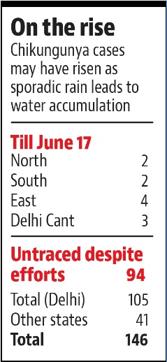Intermittent rain leads to spike in chikungunya in Delhi
There has been an unprecedented rise in the number of mosquito-borne diseases this year with 146 cases of chikungunya being reported out of which 105 are residents of Delhi. The figures cover cases reported till June 17.

Interestingly, no case of chikungunya was reported during the same period in the past three years, according to the data collated by South Delhi Municipal Corporation.
The cases are rising despite the fact that the three corporations — south, east and north, claim to have taken several measures, including intensifying anti-larvae drives to prevent mosquito breeding.
Meanwhile, 50 cases of dengue and 59 cases of malaria have also been reported in the same period. There were five cases of dengue reported in 2016, 13 in 2015 and 6 in 2014.
A senior official of south corporation said, “Ninety-eight cases of chikungunya had been reported till last week so this means that there have been an additional seven cases.”
Delhi faced its biggest ever chikungunya outbreak in 2016 with 7,760 cases being reported. Spread by mosquitoes, the viral infection causes high fever, joint swelling and pain (lower back, ankle, knees, wrists or fingers), rash, headache, nausea and fatigue.

Medical experts say that the mosquito-borne diseases spread mainly after the monsoon. The fresh trend, however, suggests that mosquitoes which are primary carrier of such diseases have developed higher tolerance to insecticides and larvicides.
A senior official of north corporation said that the corporation is taking all measures to control the vector-borne diseases. There have been door-to-door visit of the Domestic Breeding Checkers (DBCs), spraying of medicines in the waterlogged areas, and using gambushia fish to control breeding.
“The main problem, however, is that the corporation is understaffed due to lack of funds,” he added.
Around 40-50% of the posts designated for staff to keep a check on mosquito-breeding sites have been vacant for over two years. Also more than 50% of the sanctioned posts of malaria inspectors and medical officers are unoccupied in the north and east Delhi municipal corporations, HT had earlier reported.
A senior health official of the corporation said that intermittent rains in May could be the reason behind the increased numbers as sporadic showers are worse than regular rains during the monsoon.
“There is a higher chance of breeding of the aedes aegypti mosquito if the water in potholes and bottle caps in trash are left undisturbed, continuous rain washes away the larvae,” according to a health department official.
Last year, when Delhi had a chikungunya outbreak, not a single case was reported till July. In case of dengue, which affected 4,431 people in 2016, only 13 cases were reported till May end. In 2015, when Delhi had its worst ever dengue outbreak affecting nearly 16,000 and killing 60, only 11 cases had been reported till May end.




